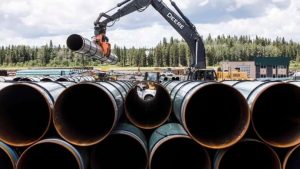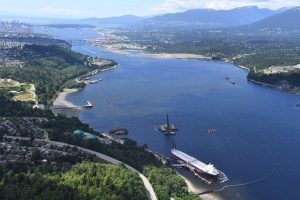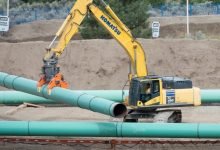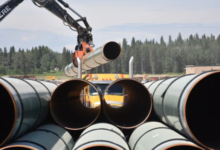Trans Mountain pipeline expansion will lead to $11.9B in losses for Canada, study says

A new study from researchers in B.C. estimates that Canada will lose $11.9 billion because of the Trans Mountain pipeline expansion project, but some industry experts question the researchers’ methodology.
Trans Mountain expansion may not be economically viable, says think tank report
The paper from a team at Simon Fraser University‘s School of Resource and Environmental Management argues there is no likely scenario in which the project would lead to a net benefit.
“The $11.9 billion loss to Canada is primarily due to a more than doubling of the Trans Mountain construction costs from the original $5.4 billion to $12.6 billion, combined with new climate policies just confirmed by the Supreme Court that will reduce the demand for oil,” lead author and SFU professor Thomas Gunton said in a press release.
The researchers suggest the government would be better off shelving the project entirely and using the funds to invest in alternative energy projects.
“Private sector companies such as BP and Shell are responding to declining demand by shifting investments from oil to green energy and the federal government should follow their lead,” Gunton said.
The Canadian government bought the Trans Mountain pipeline from energy giant Kinder Morgan in 2018 for $4.5 billion. The SFU study points out that Ottawa has not provided the public with an evaluation of the costs and benefits that led to that decision.
The expansion project involves twinning the existing 1,150-kilometre pipeline between Strathcona County, Alta., and Burnaby, B.C. It will add 980 kilometres of new pipeline and increase capacity from 300,000 barrels a day to 890,000 barrels a day.
The project is expected to be finished by December 2022, and is currently about 20 per cent complete, according to Trans Mountain.
‘Responsible investment’
In a written statement, the federal government said it’s confident that the Trans Mountain project is a “responsible investment” for Canadians, and it will invest anything earned from it into clean energy projects.
“The government does not intend to be the long-term owner of Trans Mountain Corporation. It intends to launch a divestment process after the expansion project is further de-risked and after engagement with Indigenous groups has concluded,” said the Office of the Deputy Prime Minister and Minister of Finance in an email.

Richard Masson, an executive fellow at the University of Calgary School of Public Policy and former CEO of the Alberta Petroleum Marketing Commission, questions the study’s conclusion.
“I think the some of the assumptions that they made would be strongly challenged by industry,” Masson said.
“Production hasn’t grown as much as we would like it to because we’ve been constrained on having a lack of pipeline capacity.”
Masson says the many producers are keen to see the pipeline expanded so they can meet a growing global demand for oil, despite countries trying to simultaneous meet the goals set in the Paris Climate agreement.
Although demand for oil slowed down in 2020, Masson says, it is close to reaching pre-pandemic levels and most people in the industry expect that demand to grow.
Benefit-cost analysis
The SFU team says they decided to perform a benefit-cost analysis of the project because of the sheer magnitude of Canada’s investment and significant changes that have happened since it was approved.
Their study, released Wednesday, attempts to estimate how changing economic and political conditions could affect the profitability of the project.
Those conditions include an increase in construction costs, the cancellation of the Keystone XL pipeline to the U.S., stronger federal policies to address climate change and a weaker market for oil.
None of those factors were taken into account when the National Energy Board recommended the approval of the expansion project in 2016 and then again in 2019.
The study suggests that the pipeline expansion will create excess capacity that isn’t needed and will increase the risk of environmental damage.
Ballooning price tag
The researchers place the chance of a tanker spill at 43 to 75 per cent during a 50-year operating period, and included a risk-adjusted cost of $2.6 billion in the total estimated losses for the country.
Meanwhile, the ballooning price tag for construction means that the tolls charged to shippers for using the pipelines, which were agreed upon in 2017, will not come close to covering the capital costs. The tolls were set to cover $7.4 billion in costs — or about 59 per cent of the current estimate for construction.
Based on the Canadian Energy Regulator’s November 2020 forecasts for pipeline capacity and Canadian oil exports, the authors argue that the oil that was destined to be transported through the expanded pipeline could be transported on other pipelines.
The study says that neither the Trans Mountain expansion nor Keystone XL would be required to meet that demand.








Redes Sociais - Comentários